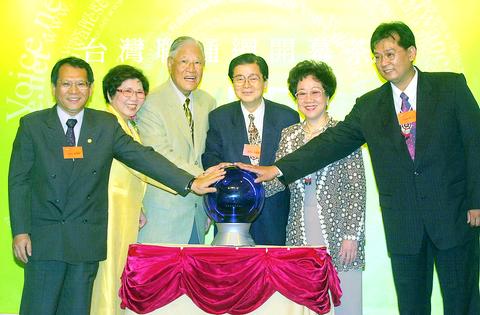Former president Lee Teng-hui (
TaiwaneseVoice.net, a Web-based radio station with ambitions to branch out into video as well, is aimed at promoting a Taiwanese consciousness and voice for Taiwan as an independent country.
"The pro-unification media have been manipulating [Taiwan's politics] behind the scenes, and have been a tool of political struggles and social conflicts," Lee said at yesterday's ceremony. "They have completely forgotten the media's social responsibility for fairness and justice."

PHOTO: CHIANG YING-YING, TAIPEI TIMES
Lee and Lu attended the ceremony as special guests. The former president promised to host a talk show for the radio station in the future when it becomes possible for the company to broadcast both sound and image.
According to the company, the name and content of Lee's talk show is still under discussion. Still, the station has decided to install the necessary equipment at Lee's house to help get the program on the air.
"The Web site will help voice Taiwan's strong desire to participate in international organizations and the international community, and will help gain international support and understanding," Lee said.
Huang Erh-hsuan (
"If our voice is not heard, we won't have any chance of getting out of our current difficult position. This Web site will serve to balance local media bias [against Taiwan] and broadcast our voices out of Taiwan," Huang said.
The Internet radio station will broadcast programs about Taiwanese culture, history and language in an effort to promote understanding and knowledge of Taiwan. It will also cooperate with Formosa TV station and broadcast the channel's news programs online.
Programs will be in Chinese, Hokkien and English. The company has also set up studios in Tokyo and Los Angles, which will produce shows on the two cities' pop cultures.
In addition to promoting Taiwanese consciousness to the world, the Web site will work with Tibetan independence activists and set up the "Tibet Channel." The channel will offer information about the Tibetan independence movement and updated news about the Dalai Lama.
The station's staff said yesterday the radio station is scheduled to interview the Dalai Lama in December.
Many heavyweight activists in favor of Taiwan's independence -- such as historian Su Beng (史明) and Lee Hung-hsi (李鴻禧), law professor at National Taiwan University -- as well as many DPP key members, such as Cabinet Secretary-General Lee Ying-yuan (李應元), attended yesterday's ceremony to show their support for the radio station.
The vice president yesterday called on the public to stop debating unification and independence, saying that Taiwan is already an independent country.
"What we need to do is to unify our country, which is in danger of splitting, in terms of culture and political beliefs," Lu said.
"There are no more indigenous Taiwanese (本省人) or mainlanders (外省人). Instead, there are compatriots and foreigners in this country. Taiwan is facing a crisis," Lu warned.

The CIA has a message for Chinese government officials worried about their place in Chinese President Xi Jinping’s (習近平) government: Come work with us. The agency released two Mandarin-language videos on social media on Thursday inviting disgruntled officials to contact the CIA. The recruitment videos posted on YouTube and X racked up more than 5 million views combined in their first day. The outreach comes as CIA Director John Ratcliffe has vowed to boost the agency’s use of intelligence from human sources and its focus on China, which has recently targeted US officials with its own espionage operations. The videos are “aimed at

STEADFAST FRIEND: The bills encourage increased Taiwan-US engagement and address China’s distortion of UN Resolution 2758 to isolate Taiwan internationally The Presidential Office yesterday thanked the US House of Representatives for unanimously passing two Taiwan-related bills highlighting its solid support for Taiwan’s democracy and global participation, and for deepening bilateral relations. One of the bills, the Taiwan Assurance Implementation Act, requires the US Department of State to periodically review its guidelines for engagement with Taiwan, and report to the US Congress on the guidelines and plans to lift self-imposed limitations on US-Taiwan engagement. The other bill is the Taiwan International Solidarity Act, which clarifies that UN Resolution 2758 does not address the issue of the representation of Taiwan or its people in

US Indo-Pacific Commander Admiral Samuel Paparo on Friday expressed concern over the rate at which China is diversifying its military exercises, the Financial Times (FT) reported on Saturday. “The rates of change on the depth and breadth of their exercises is the one non-linear effect that I’ve seen in the last year that wakes me up at night or keeps me up at night,” Paparo was quoted by FT as saying while attending the annual Sedona Forum at the McCain Institute in Arizona. Paparo also expressed concern over the speed with which China was expanding its military. While the US

SHIFT: Taiwan’s better-than-expected first-quarter GDP and signs of weakness in the US have driven global capital back to emerging markets, the central bank head said The central bank yesterday blamed market speculation for the steep rise in the local currency, and urged exporters and financial institutions to stay calm and stop panic sell-offs to avoid hurting their own profitability. The nation’s top monetary policymaker said that it would step in, if necessary, to maintain order and stability in the foreign exchange market. The remarks came as the NT dollar yesterday closed up NT$0.919 to NT$30.145 against the US dollar in Taipei trading, after rising as high as NT$29.59 in intraday trading. The local currency has surged 5.85 percent against the greenback over the past two sessions, central